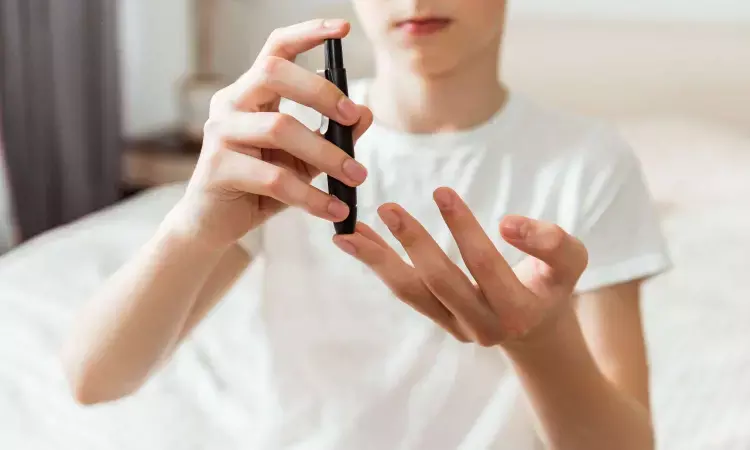- Home
- Medical news & Guidelines
- Anesthesiology
- Cardiology and CTVS
- Critical Care
- Dentistry
- Dermatology
- Diabetes and Endocrinology
- ENT
- Gastroenterology
- Medicine
- Nephrology
- Neurology
- Obstretics-Gynaecology
- Oncology
- Ophthalmology
- Orthopaedics
- Pediatrics-Neonatology
- Psychiatry
- Pulmonology
- Radiology
- Surgery
- Urology
- Laboratory Medicine
- Diet
- Nursing
- Paramedical
- Physiotherapy
- Health news
- Fact Check
- Bone Health Fact Check
- Brain Health Fact Check
- Cancer Related Fact Check
- Child Care Fact Check
- Dental and oral health fact check
- Diabetes and metabolic health fact check
- Diet and Nutrition Fact Check
- Eye and ENT Care Fact Check
- Fitness fact check
- Gut health fact check
- Heart health fact check
- Kidney health fact check
- Medical education fact check
- Men's health fact check
- Respiratory fact check
- Skin and hair care fact check
- Vaccine and Immunization fact check
- Women's health fact check
- AYUSH
- State News
- Andaman and Nicobar Islands
- Andhra Pradesh
- Arunachal Pradesh
- Assam
- Bihar
- Chandigarh
- Chattisgarh
- Dadra and Nagar Haveli
- Daman and Diu
- Delhi
- Goa
- Gujarat
- Haryana
- Himachal Pradesh
- Jammu & Kashmir
- Jharkhand
- Karnataka
- Kerala
- Ladakh
- Lakshadweep
- Madhya Pradesh
- Maharashtra
- Manipur
- Meghalaya
- Mizoram
- Nagaland
- Odisha
- Puducherry
- Punjab
- Rajasthan
- Sikkim
- Tamil Nadu
- Telangana
- Tripura
- Uttar Pradesh
- Uttrakhand
- West Bengal
- Medical Education
- Industry
Growth hormone mediators linked with unique phenotype of pediatric type 2 diabetes: TODAY analysis

USA: A post hoc secondary analysis of a randomized clinical trial (TODAY) of 398 participants with youth-onset type 2 diabetes (T2D) revealed that growth hormone mediators may be linked with the unique phenotype of pediatric T2D.
The study, published in JAMA Network Open, suggests that changes in plasma growth hormone mediators are linked with loss of glycemic control in youth-onset T2D, with plasma insulin-like growth factor-1 associated with lower risk and growth hormone receptor and insulin-like growth factor binding protein 1 associated with increased risk.
"Changes from baseline to 3 years in plasma concentrations of growth hormone mediators, including growth hormone receptor, insulin-like growth factor-1, and insulin-like growth factor binding protein 1, were associated with measures of insulin resistance and beta cell function and glycemic failure," the researchers reported.
Youth-onset type 2 diabetes has a more aggressive phenotype than adult-onset T2D, including increased complication risk and rapid loss of glycemic control. Chang Lu, Harvard Medical School, Boston, Massachusetts, and colleagues aimed to identify associations of growth hormone mediators with beta cell function, glycemic failure, and insulin sensitivity in youth-onset type 2 diabetes. The loss of glycemic control was defined as a haemoglobin A1c (HbA1c) level of 8% or more for six months or an inability to wean from insulin therapy.
The post hoc secondary analysis of the TODAY randomized clinical trial included 398 participants (mean age, 13.9 years; 62% girls) from 15 university-affiliated medical centres with available plasma samples from baseline and 36 months.
Participants comprised youth aged 10 to 17 years with a T2D duration of less than 2 years who were randomized to metformin, metformin plus rosiglitazone, or metformin plus lifestyle intervention. Participants were followed up for a median of 3.9 years during the trial, ending in 2011.
Exposures included growth hormone receptor (GHR), plasma insulin-like growth factor-1 (IGF-1), and insulin-like growth factor binding protein 1 (IGFBP-1).
The study's outcomes were (1) loss of glycemic control during the TODAY study and (2) baseline and 36-month measures of glycemia (fasting glucose, HbA1c), high-molecular-weight adiponectin, insulin sensitivity (1/fasting C-peptide), and beta cell function (C-peptide oral disposition index, C-peptide index).
The analysis led to the following findings:
- A higher increase in IGF-1 level between baseline and 36 months was associated with lower odds of glycemic failure (odds ratio [OR], 0.995) and higher C-peptide index per 100-ng/mL increase in IGF-1 (β, 0.015).
- A higher increase in log2 GHR level between baseline and 36 months was associated with higher odds of glycemic failure (OR, 1.75) and lower C-peptide index (β, −0.02).
- A higher increase in log2 IGFBP-1 level between baseline and 36 months was associated with higher odds of glycemic failure (OR, 1.37) and higher high-molecular-weight adiponectin (β, 431).
In conclusion, the researchers found novel associations of plasma GH mediator levels with measures of glycemia, glycemic failure, beta cell function, and insulin sensitivity in youths with T2D. However, additional mechanistic or longitudinal studies would help to explain the mechanism by which GH mediators impact glycemia or vice versa.
"Whether alterations in GH mediators may facilitate progression from prediabetes to type 2 diabetes or accelerated onset of diabetes complications in youth-onset T2D are important topics for future studies," the researchers wrote.
Reference:
Lu C, Wolfs D, El ghormli L, et al. Growth Hormone Mediators and Glycemic Control in Youths With Type 2 Diabetes: A Secondary Analysis of a Randomized Clinical Trial. JAMA Netw Open. 2024;7(2):e240447. doi:10.1001/jamanetworkopen.2024.0447
Dr Kamal Kant Kohli-MBBS, DTCD- a chest specialist with more than 30 years of practice and a flair for writing clinical articles, Dr Kamal Kant Kohli joined Medical Dialogues as a Chief Editor of Medical News. Besides writing articles, as an editor, he proofreads and verifies all the medical content published on Medical Dialogues including those coming from journals, studies,medical conferences,guidelines etc. Email: drkohli@medicaldialogues.in. Contact no. 011-43720751


